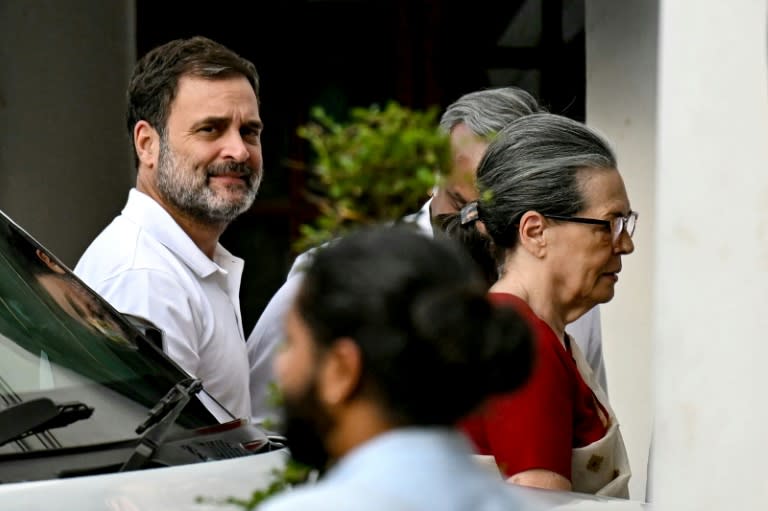Rahul Gandhi nominated as leader of India's opposition

Prime Minister Narendra Modi's chief rival Rahul Gandhi was nominated on Saturday to lead India's opposition in parliament after an election result that rescued his party from the political wilderness.
Modi will be sworn into office for a third term this weekend following a poll that deprived his ruling Bharatiya Janata Party (BJP) of a majority, forcing it to rely on coalition allies to govern.
Gandhi defied analysts' expectations and exit polls to help his Congress party nearly double its parliamentary numbers, its best result since Modi was swept to power a decade ago.
A meeting of the Congress leadership on Saturday voted unanimously to recommend Gandhi's election as India's official opposition leader, a post that had been left vacant since 2014.
"All participants unanimously passed the resolution that Rahul Gandhi should take the position of leader of opposition in the parliament," Congress general secretary K.C. Venugopal told a news conference afterwards.
The nomination will be put before a meeting of lawmakers belonging to a Congress-led opposition alliance later on Saturday.
Gandhi is the scion of the dynasty that dominated Indian politics for decades and is the son, grandson and great-grandson of former prime ministers, beginning with independence leader Jawaharlal Nehru.
If elected, as expected, he will be recognised as India's official opposition leader when the new parliament sits, which local media reports suggest will happen as soon as early next week.
Parliamentary regulations require the opposition leader to come from a party that commands at least 10 percent of the lawmakers in the 543-seat lower house.
The post has been vacant for 10 years because two dismal election results for Congress -- once India's dominant party -- left it short of that threshold.
- 'Target political opponents' -
Gandhi is one of several top opposition figures to face criminal proceedings in cases they claim are politically driven by Modi's government.
He was sentenced to two years imprisonment last year in 2023 in a separate case in Gujarat but was not jailed after appealing with India's top court.
The sentence did, however, force his brief disqualification from parliament until the Supreme Court suspended his conviction.
On Friday, he made another brief court appearance in the tech hub of Bengaluru, in a case brought by a BJP member for accusing the party of corruption in its administration of the southern state of Karnataka.
US think tank Freedom House said this year that the BJP had "increasingly used government institutions to target political opponents".
Delhi chief minister Arvind Kejriwal, an ally of Gandhi's, was jailed this year in connection with an ongoing graft investigation.
- 'Another chance' -
Tuesday's election results increased the party's parliamentary representation from 52 to 99 seats.
A statement from the Congress executive said that "many challenges" remained in the party's road to reclaiming its credibility and returning to government in the future.
"The people of India have spoken -- the Congress has been given another chance," the statement said.
"It is now up to us to build on it. We must and we will."
Modi and his Hindu-nationalist BJP ruled outright for the past decade but failed to repeat its previous two landslide wins this time, despite widespread expectations of another easy triumph.
He was instead forced into quick-fire talks with the 15-member National Democratic Alliance (NDA) coalition, which guaranteed him the parliamentary numbers to govern.
There are no indications yet of what concessions Modi may have offered in return, though several larger coalition allies are reported to be seeking cabinet posts.
The NDA has 293 members in the next parliament, 21 above a simple majority.
Modi and his new ministers will be sworn in by President Droupadi Murmu on Sunday evening.
Leaders of India's neighbours including Bangladeshi Prime Minister Skeikh Hasina began arriving in New Delhi on Saturday for the ceremony.
Tesla founder Elon Musk was among the latest international figures to congratulate Modi on his re-election, writing on his social media platform X that he was looking forward to his companies "doing exciting work in India".
"Appreciate your greetings," Modi wrote in his Saturday response.
"Our demography, predictable politics and stable democratic polity will continue to provide the business environment for all our partners."
pzb/gle/qan


